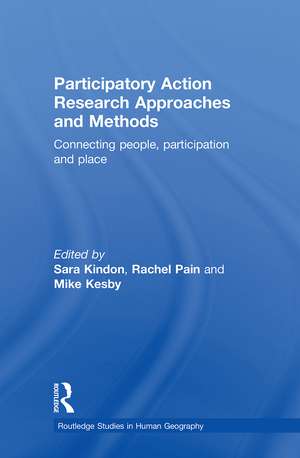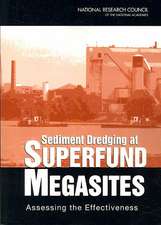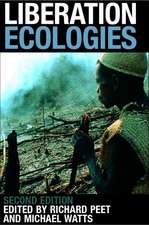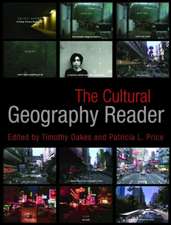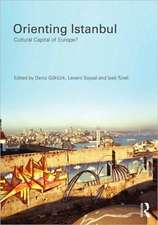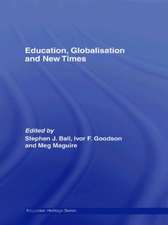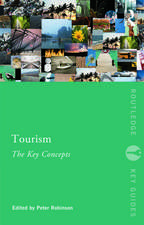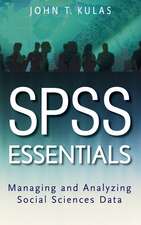Participatory Action Research Approaches and Methods: Connecting People, Participation and Place: Routledge Studies in Human Geography
Editat de Sara Kindon, Rachel Pain, Mike Kesbyen Limba Engleză Paperback – 31 aug 2010
This book captures these developments, exploring the justification, theorisation, practice and implications of PAR. It offers a critical introduction to understanding and working with PAR in different social, spatial and institutional contexts. The authors engage with PAR’s radical potential, while maintaining a critical awareness of its challenges and dangers. The book is divided into three parts. The first part explores the intellectual, ethical and pragmatic contexts of PAR; the development and diversity of approaches to PAR; recent poststructuralist perspectives on PAR as a form of power; the ethic of participation; and issues of safety and well-being. Part two is a critical exploration of the politics, places and practices of PAR. Contributors draw on diverse research experiences with differently situated groups and issues including environmentally sustainable practices, family livelihoods, sexual health, gendered experiences of employment, and specific communities such as people with disabilities, migrant groups, and young people. The principles, dilemmas and strategies associated with participatory approaches and methods including diagramming, cartographies, art, theatre, photovoice, video and geographical information systems are also discussed. Part three reflects on how effective PAR is, including the analysis of its products and processes, participatory learning, representation and dissemination, institutional benefits and challenges, and working between research, action, activism and change.
The authors find that a spatial perspective and an attention to scale offer helpful means of negotiating the potentials and paradoxes of PAR. This approach responds to critiques of PAR by highlighting how the spatial politics of practising participation can be mobilised to create more effective and just research processes and outcomes. The book adds significant weight to the recent critical reappraisal of PAR, suggesting why, when, where and how we might take forward PAR’s commitment to enabling collaborative social transformation. It will be particularly useful to researchers and students of Human Geography, Development Studies and Sociology.
| Toate formatele și edițiile | Preț | Express |
|---|---|---|
| Paperback (1) | 419.50 lei 6-8 săpt. | |
| Taylor & Francis – 31 aug 2010 | 419.50 lei 6-8 săpt. | |
| Hardback (1) | 1277.00 lei 6-8 săpt. | |
| Taylor & Francis – 20 dec 2007 | 1277.00 lei 6-8 săpt. |
Din seria Routledge Studies in Human Geography
-
 Preț: 332.18 lei
Preț: 332.18 lei -
 Preț: 371.71 lei
Preț: 371.71 lei -
 Preț: 334.09 lei
Preț: 334.09 lei -
 Preț: 341.09 lei
Preț: 341.09 lei - 18%
 Preț: 1057.75 lei
Preț: 1057.75 lei - 18%
 Preț: 1072.71 lei
Preț: 1072.71 lei - 16%
 Preț: 299.87 lei
Preț: 299.87 lei -
 Preț: 490.62 lei
Preț: 490.62 lei - 28%
 Preț: 823.63 lei
Preț: 823.63 lei - 18%
 Preț: 1058.79 lei
Preț: 1058.79 lei - 18%
 Preț: 1054.71 lei
Preț: 1054.71 lei - 17%
 Preț: 296.11 lei
Preț: 296.11 lei - 18%
 Preț: 1057.89 lei
Preț: 1057.89 lei - 28%
 Preț: 822.76 lei
Preț: 822.76 lei - 18%
 Preț: 732.06 lei
Preț: 732.06 lei -
 Preț: 414.32 lei
Preț: 414.32 lei - 18%
 Preț: 1062.98 lei
Preț: 1062.98 lei - 18%
 Preț: 702.31 lei
Preț: 702.31 lei - 18%
 Preț: 1057.09 lei
Preț: 1057.09 lei - 18%
 Preț: 1169.66 lei
Preț: 1169.66 lei - 18%
 Preț: 1114.98 lei
Preț: 1114.98 lei -
 Preț: 407.40 lei
Preț: 407.40 lei - 28%
 Preț: 823.08 lei
Preț: 823.08 lei -
 Preț: 373.59 lei
Preț: 373.59 lei - 5%
 Preț: 353.14 lei
Preț: 353.14 lei - 18%
 Preț: 1055.06 lei
Preț: 1055.06 lei - 18%
 Preț: 1058.69 lei
Preț: 1058.69 lei - 18%
 Preț: 1065.06 lei
Preț: 1065.06 lei - 18%
 Preț: 1060.87 lei
Preț: 1060.87 lei - 18%
 Preț: 1069.92 lei
Preț: 1069.92 lei -
 Preț: 418.65 lei
Preț: 418.65 lei -
 Preț: 446.58 lei
Preț: 446.58 lei -
 Preț: 408.74 lei
Preț: 408.74 lei -
 Preț: 423.30 lei
Preț: 423.30 lei - 18%
 Preț: 1055.51 lei
Preț: 1055.51 lei - 28%
 Preț: 878.82 lei
Preț: 878.82 lei - 18%
 Preț: 1061.57 lei
Preț: 1061.57 lei - 28%
 Preț: 849.84 lei
Preț: 849.84 lei - 18%
 Preț: 733.11 lei
Preț: 733.11 lei - 28%
 Preț: 852.64 lei
Preț: 852.64 lei - 12%
 Preț: 338.81 lei
Preț: 338.81 lei - 31%
 Preț: 764.20 lei
Preț: 764.20 lei
Preț: 419.50 lei
Nou
Puncte Express: 629
Preț estimativ în valută:
80.30€ • 87.25$ • 67.49£
80.30€ • 87.25$ • 67.49£
Carte tipărită la comandă
Livrare economică 22 aprilie-06 mai
Preluare comenzi: 021 569.72.76
Specificații
ISBN-13: 9780415599764
ISBN-10: 0415599768
Pagini: 288
Ilustrații: 35 black & white illustrations, 72 black & white tables, 26 black & white halftones, 9 black & white line drawings
Dimensiuni: 156 x 234 x 15 mm
Greutate: 0.53 kg
Ediția:1
Editura: Taylor & Francis
Colecția Routledge
Seria Routledge Studies in Human Geography
Locul publicării:Oxford, United Kingdom
ISBN-10: 0415599768
Pagini: 288
Ilustrații: 35 black & white illustrations, 72 black & white tables, 26 black & white halftones, 9 black & white line drawings
Dimensiuni: 156 x 234 x 15 mm
Greutate: 0.53 kg
Ediția:1
Editura: Taylor & Francis
Colecția Routledge
Seria Routledge Studies in Human Geography
Locul publicării:Oxford, United Kingdom
Public țintă
PostgraduateCuprins
1. Introduction: Connecting People, Participation and Place Part 1: Reflection 2. Participatory Action Research: Origins, Approaches and Methods 3. Participation as a Form of Power: Retheorising Empowerment and Spatialising Participatory Action Research 4. Participatory Action Research: Making a Difference to Theory, Practice and Action 5. Toward a Participatory Ethics 6. Participatory Action Research and Researcher Safety Part 2: Action 7. Environment and Development: (Re)Connecting Community and Commons in New England Fisheries, USA 8. Working Towards and beyond Collaborative Resource Management: Parks, People and Participation in the Peruvian Amazon 9. Researching Sexual Health: Two Participatory Action Research Projects in Zimbabwe 10. Gender and Employment: Participatory Social Auditing in Kenya 11. Inclusive Methodologies: Including Disabled People in Participatory Action Research in Scotland and Canada 12. Working with Migrant Communities: Collaborating with the Kalayaan Centre in Vancouver, Canada 13. Peer Research with Youth: Negotiating (Sub)Cultural Capital, Place and Participation in Aotearoa/New Zealand 14. Participatory Diagramming: A Critical View from North East England 15. Participatory Cartographies: Reflections from Research Performances in Fiji and Tanzania 16. Participatory Art: Capturing Spatial Vocabularies in a Collaborative Visual Methodology 17. Participatory Theatre: ‘Creating a Source for Staging an Example’ in the USA 18. Photovoice: Insights into Marginalisation through a ‘Community Lens’ in Saskatchewan, Canada 19. Uniting People with Place Using Participatory Video in Aotearoa/New Zealand: A Ngati Hauiti Journey 20. Participatory GIS: The Humboldt/West Humboldt Park Community GIS Project, Chicago, USA Part 3: Reflection 21. Participatory Data Analysis 22. Participatory Learning: Opportunities and Challenges 23. Beyond the Journal Article: Representations, Audience and the Presentation of Participatory Action Research 24. Linking Participatory Research to Action: Institutional Challenges 25. Relating Action to Activism: Theoretical and Methodological Reflections. Conclusion 26. Conclusion: The Space(s) and Scale(s) of Participatory Action Research: Constructing Empowering Geographies?
Notă biografică
Sara Kindon is a Senior Lecturer in Human Geography and Development Studies at Victoria University of Wellington, Aotearoa/New Zealand. Her research interests focus on participation, visuality and cross-cultural research. She has worked in Costa Rica, Indonesia and in rural and urban contexts in Aotearoa/New Zealand.
Rachel Pain is a social geographer at Durham University in the UK. Her research interests include fear, well-being and social justice. She is currently conducting PAR with young asylum seekers, refugees and locally born young people in north east England.
Mike Kesby is a Lecturer in Human Geography at the University of St Andrews, Scotland, UK. His research interests include participatory methods, HIV education programs, gender relations and children’s geographies. He works predominately in rural Zimbabwe.
Rachel Pain is a social geographer at Durham University in the UK. Her research interests include fear, well-being and social justice. She is currently conducting PAR with young asylum seekers, refugees and locally born young people in north east England.
Mike Kesby is a Lecturer in Human Geography at the University of St Andrews, Scotland, UK. His research interests include participatory methods, HIV education programs, gender relations and children’s geographies. He works predominately in rural Zimbabwe.
Descriere
This book examines the justification, theorization, practice and implications of Participatory Action Research approaches and methods in the social and environmental sciences.
